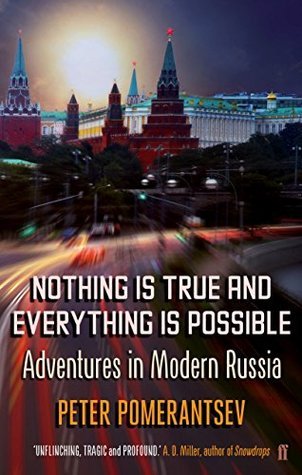What do you think?
Rate this book


284 pages, Paperback
First published November 11, 2014
In an ever-changing, incomprehensible world the masses had reached the point where they would, at the same time, believe everything and nothing, think that everything was possible and nothing was true. The totalitarian mass leaders based their propaganda on the correct psychological assumption that, under such conditions, one could make people believe the most fantastic statements one day, and trust that if the next day they were given irrefutable proof of their falsehood, they would take refuge in cynicism; instead of deserting the leaders who had lied to them, they would protest that they had known all along that the statement was a lie and would admire the leaders for their superior tactical cleverness.
Among the standard “Women For Trump,” “Blacks For Trump” and “Promises Made, Promises Kept” signs, the video shows a few others. They featured the letter “Q,” a reference to QAnon, a conspiracy theory gaining traction among some of Trump’s most ardent supporters. In a nutshell, followers of QAnon fashion themselves as detectives, or “bakers,” who try to make sense out of vague bits of information, or “bread crumbs,” left for them on the Internet by “Q,” a mysterious figure purporting to be a government official with high-level clearance. The clues left by “Q” have led his disciples to believe that Special Counsel Mueller’s investigation is a cover, and Mueller is actually working in tandem with Trump to take down a murderous cabal of liberal elites that includes everyone from Tom Hanks to Barack Obama. QAnon believes these elites have been running an elaborate child sex ring for years, and that there is a “storm” coming in which Trump will throw all of these pedophiles in jail once and for all. As NBC News reporter Ben Collins described it on Tuesday, QAnon is like “Pizzagate on bath salts.”

"Just remember, what you are seeing and what you are reading is not what’s happening.” - Donald Trump, 2018.
"The Party told you to reject the evidence of your eyes and ears. It was their final, most essential command." - George Orwell, "1984".
This isn't a country in transition but some sort of postmodern dictatorship that uses the language and institutions of democratic capitalism for authoritarian ends.How regularly, completely or pervasively did it use (or co-opt) that language? When, if ever, would it be possible to clearly see "democratic rhetoric [used with] undemocratic intent"?
The brilliance of this new type of authoritarianism is that instead of simply oppressing opposition, as had been the case with twentieth-century strains, it climbs inside all ideologies and movements, exploiting and rendering them absurd.So, to the journalist, the status quo in late '90s Russia seemed... not so bad. You more or less knew what the rules were.
Russians have more words for "bribe" than Eskimos do for "snow."Upon finishing this book, another overriding impression one could have is one of chaos. Chaos by design. I'm hoping to learn more by way of the author's follow-up: 'This Is Not Propaganda: Adventures in the War Against Reality'. But this first, very accessible volume is a valuable introduction to modern-day Russia... in all of its growing darkness.
The victims I meet never talk of human rights or democracy; the Kremlin has long learned to use this language and has eaten up all the space within which and opposition could articulate itself. The rage is more inchoate: hatred of the cops, the army. Or, blame it all on foreigners. Some teens, the anarchists and artists, have started to gather and protest, rushing out of the metro and cutting off the roads and the main squares. They call their gatherings ‘monstrations’ and carry absurdist barriers:
‘The sun is your enemy’
‘We will make the English Japanese’
‘Eifiyatoloknu for president’
The only response to the absurdity of the Kremlin is to be absurd back.
"Politics is the ability to use any situation to advance your own status," Sergey told me with a smile that seemed to mimic Surkov’s (whose in turn mimics the KGB men's). "How do you define your political views?" I asked him. He looked at me like I was a fool to ask, then smiled, "I’m a liberal… It can mean anything!"
... the office of the presidential administration, where Surkov would sit behind a desk with phones bearing the names of all the “independent” party leaders, calling and directing them at any moment, day or night. The brilliance of this new type of authoritarianism is that instead of simply oppressing opposition, as had been the case with twentieth-century strains, it climbs inside all ideologies and movements, rendering them absurd. One moment Surkov would fund civic forums and human rights NGOs, the next he would quietly support nationalist movements that accuse the NGOs of being tools of the West. With a flourish he sponsored lavish arts festivals for the most provocative modern artists in Moscow, then supported Orthodox fundamentalists, dressed all in black and carrying crosses, who in turn attacked the modern art exhibitions...